Related Research Articles
Djibouti is a country in the Horn of Africa bordered by Somalia to the east, Eritrea to west and the Red Sea to the north, Ethiopia to the west and south, and the Gulf of Aden to the east.
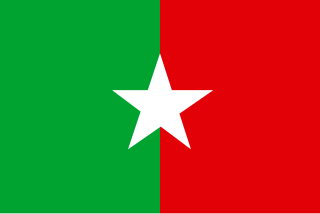
The Western Somali Liberation Front was a Somali movement fighting in eastern Ethiopia to liberate the Ogaden region from Ethiopian control. It played a major role in the Ogaden War of 1977–78, assisting the invading Somali Army.

The Derg, officially the Provisional Military Administrative Council (PMAC), was the military dictatorship that ruled Ethiopia, then including present-day Eritrea, from 1974 to 1987, when the military leadership or junta formally "civilianized" the administration but stayed in power until 1991.
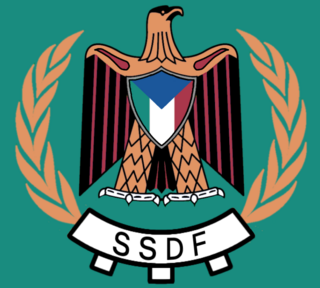
Somali Salvation Democratic Front (SSDF) (Somali: Jabhadda Diimuqraadiga Badbaadinta Soomaaliyeed), initially known as the Democratic Front for Salvation of Somalia, was a political and paramilitary umbrella organization in Somalia. Founded in 1978 by several army officers, it was the first of several opposition groups dedicated to ousting the authoritarian regime of Mohamed Siad Barre. With its power base mainly in the Majeerteen clan, SSDF played a significant role in the country's complex political landscape during the late 1970s and 2000s. And Succeeded by the establishment in 1998 of the autonomous Puntland state in northeastern Somalia.

The Isaaq is a major Somali clan. It is one of the largest Somali clan families in the Horn of Africa, with a large and densely populated traditional territory.

The Afar National Democratic Party was a political party in Ethiopia. At the legislative elections held on 15 May 2005, the party won 8 seats, all from the Afar Region. The current Minister of Social Affairs and the Deputy Chairman of Pastoralist Affairs are members of the party.
The Somali Democratic Party, formerly the Ethiopian Somali People's Democratic Party, was a political party in Ethiopia, created by the ruling Ethiopian People's Revolutionary Democratic Front (EPRDF) after refusing Somali demands for self-determination in 1993. The EPRDF created a surrogate party called the Ethiopian Somali Democratic League which was one of many satellite organisations existing throughout Ethiopia. The organisation was led by Ahmed Shide.

Ahmed Mohamed Mohamoud "Silanyo" is a Somaliland politician who was President of Somaliland from 2010 to 2017. He is a long-time member of the government, having served as Minister of Commerce of the Somali Republic, and among other Cabinet positions. During the 1980s, he also served as the Chairman of the Somali National Movement.
Issa and Gurgura Liberation Front (IGLF) was a political faction in eastern Ethiopia, led by Riyaale Ahmed Formed in 1991.

Mohammad Ali Samatar. was a Somali military officer, politician, former Commander-in-Chief of the Somali National Army, former Minister of Defence, former Vice President, former Deputy General Secretary of the Somali Revolutionary Socialist Party, and former Prime Minister. He was known for his intelligent military tactics in the 1964 Ethiopian–Somali Border War, Ogaden War and 1982 Ethiopian–Somali Border War.

The Dir is one of the largest and most prominent Somali clans in the Horn of Africa. They are also considered to be the oldest Somali stock to have inhabited the region. Its members inhabit Djibouti, Somalia, Ethiopia, and northeastern Kenya.
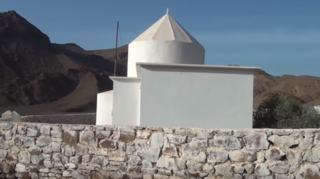
The Issa is a northern Somali clan, a sub-division of the Dir clan family.
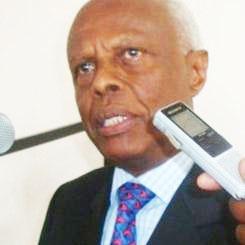
Hussein Ali Dualeh, commonly known as Awil, is a Somali diplomat and politician who served as the Finance Minister of Somaliland, and former ambassador of the Somali Democratic Republic to Kenya and Uganda. Dualeh was appointed as presidential advisor on Foreign Affairs and International Recognition to Somaliland to former President Ahmed Mohamed Mohamoud and Senior Adviser to the President Muse Bihi Abdi to negotiate with Somalia. He is considered a great expert on the affairs of the Horn of Africa.
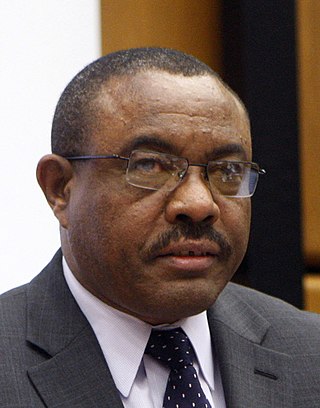
Hailemariam Desalegn Boshe is an Ethiopian politician who served as prime minister of Ethiopia from 2012 to 2018. He also previously served as deputy prime minister and Minister of Foreign Affairs under Prime Minister Meles Zenawi from 2010 to 2012. After Meles' death in August 2012, Hailemariam succeeded him as prime minister, initially in an acting capacity. He was then elected as the chair of the EPRDF, the ruling party, on 15 September 2012. Hailemariam also served as the chairperson of the African Union from 2013 to 2014.
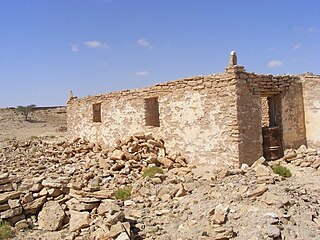
The Harti, (Somali: Harti, Arabic: هرتي, lit. 'strong man'), are a Somali clan that trace their lineage back to SalehAbdi (Harti). They are a sub-clan of the larger Darod clan. Notable sub-clans within Harti include the Majeerteen, Dhulbahante, and the Warsengeli. They predominantly reside in the apex of the Horn of Africa and its surrounding regions. Furthermore, in the southern territories, the clan's settlements span both sides of the Kenya-Somalia border.

The Ethiopian Somali Democratic League (ESDL) was a political party in the Somali Region of Ethiopia. It was the ruling EPRDF's regional partner from 1994 to 1998.

Abdullah Mohamed Fadil, also known as Abdalla Mohamed Fadil, was a prominent Somali military figure.
The Gurgura, Gorgorah or Gurgure is a northern Somali clan, a sub-division of the Dir clan family.
The 1995 Ethiopian Federal Constitution formalizes an ethnic federalism law aimed at undermining long-standing ethnic imperial rule, reducing ethnic tensions, promoting regional autonomy, and upholding unqualified rights to self-determination and secession in a state with more than 80 different ethnic groups. But the constitution is divisive, both among Ethiopian nationalists who believe it undermines centralized authority and fuels interethnic conflict, and among ethnic federalists who fear that the development of its vague components could lead to authoritarian centralization or even the maintenance of minority ethnic hegemony. Parliamentary elections since 1995 have taken place every five years since enactment. All but one of these have resulted in government by members of the Ethiopian People's Revolutionary Democratic Front (EPRDF) political coalition, under three prime ministers. The EPRDF was under the effective control of the Tigray People's Liberation Front (TPLF), which represents a small ethnic minority. In 2019 the EPRDF, under Abiy, was dissolved and he inaugurated the pan-ethnic Prosperity Party which won the 2021 Ethiopian Election, returning him as prime minister. But both political entities were different kinds of responses to the ongoing tension between constitutional ethnic federalism and the Ethiopian state's authority. Over the same period, and all administrations, a range of major conflicts with ethnic roots have occurred or continued, and the press and availability of information have been controlled. There has also been dramatic economic growth and liberalization, which has itself been attributed to, and used to justify, authoritarian state policy.
References
- ↑ Murison, Katharine. Africa South of the Sahara 2003. Taylor & Francis Group. p. 400.
- ↑ Maclennan, Ben. Mining scorecard ready for publication. Mail&Guardian.
- ↑ Mahifere, Seifu. His Excellency Ambassador Mahmoud Dirir, Minister of Culture & Tourism, Federal Democratic Republic of Ethiopia A Life in Politics and Diplomacy. Africa Travel Magazine.
- ↑ ETH30381.E of 4 November 1998 on the treatment of Issa in Ethiopia; whether a family relation to someone known to be (have been) active in, and financially supportive of, the Western Somali Liberation Front (WSLF) would affect this treatment. IRB – Immigration and Refugee Board of Canada.
- ↑ Press Digest Volume 10, Issues 1-26. Anasir Publishers. p. 10.
- ↑ Impact Assessment of Capacity Building Projects in the Ethiopian Justice Sector Institutions (PDF). The Africa-Europe Partnership Institute for Capacity Building and Human Resource Development. p. 87.
- ↑ Ethiopia Freezes Nile Water Treaty in Sign of Thaw With Egypt. VOA.
- ↑ Verdier, Isabelle. Ethiopia The Top 100 People. Indigo Publications. p. 96.